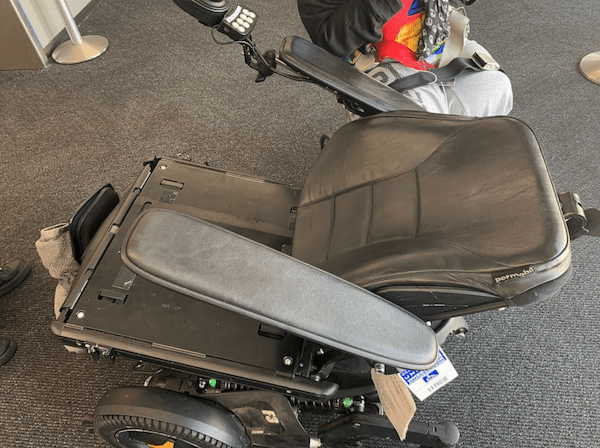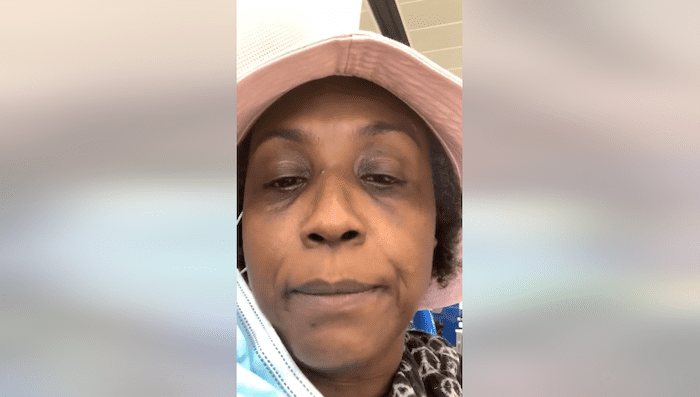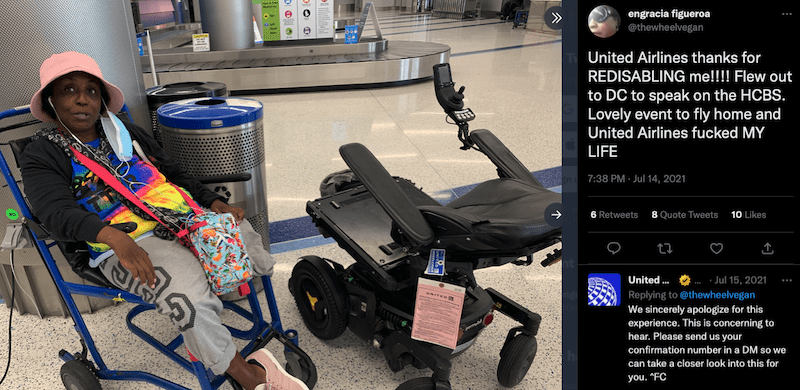Wheelchairs & Airlines: Why Is Flying So Risky for Those With Disabilities?

Disability advocate Engracia Figueroa’s broken wheelchair at Los Angeles International Airport on July 14, 2021. (Source)
January 18, 2023 ~ By Shari Rose
In October 2022 alone, airlines broke or lost over 1,000 wheelchairs and scooters. But the risk of flying for those with disabilities extends beyond broken wheelchairs
For those with disabilities, wheelchairs are not interchangeable pieces of equipment. They are an extension of the body and an absolute necessity for people to live independently. When United Airlines broke a custom wheelchair that belonged to disability advocate Engracia Figueroa, she said the airline was responsible for “re-disabling” her. Advocates liken the act of breaking a wheelchair to breaking someone’s legs. Their mobility, their independence, their freedom, is gone in an instant.
Moreover, 1 out of 8 Americans has a mobility impairment, and many rely on the use of a wheelchair to get around. So why is the phenomenon of airlines breaking wheelchairs so prevalent, and what can be done about it?
How Many Wheelchairs Are Damaged by Airlines?
Unlike other popular forms of public transportation, such as buses and boats, airlines do not allow passengers with disabilities to sit in their personal wheelchairs while aboard an airplane. Instead, those who use wheelchairs must have their device stowed on the aircraft and sit in a plane seat. This standard forces people with disabilities to risk damaging their mobility device every time they board a plane.
At the end of 2018, a new federal law began requiring U.S. airlines to report how many wheelchairs and scooters they damage or lose each month. The hard numbers are astonishing.
In 2019, the first full year of reporting, airlines admitted to breaking or losing a total 10,548 wheelchairs and scooters. That translates to approximately 29 incidents each day. And according to the most recent data, their tendency to break wheelchairs is even worse in 2022.
In October 2022 alone, airlines broke or lost 1,086 wheelchairs and scooters. In just 30 days, over 1,000 owners of mobility devices had their lives turned upside down by airlines. From January 2022 to October 2022 (the most recent available data), airlines reported that they had damaged or lost a total of 9,350 wheelchairs and scooters. That breaks down to 30.7 incidents per day, a trend that has only worsened in recent years.

While stuck at LAX, Engracia Figueroa speaks in a Facebook Live video about the irreparable damage that United Airlines caused to her customized wheelchair earlier in the day. (Source)
Those with disabilities who lose access to their custom-made wheelchairs face a litany of dangerous implications that affect their physical and emotional health. In some cases, the consequences of a broken wheelchair can be deadly.
Engracia Figueroa’s Fight After an Airline Broke Her Wheelchair
Engracia Figueroa was a prominent disability advocate who flew to Washington D.C. in July 2021 to speak at the Care Can’t Wait Rally, an event that advocates for a range of home care initiatives, such as improved infrastructure for childcare and long-term care services. As a representative of California’s Hand in Hand chapter, Figueroa flew to D.C. and participated in the rally without a hitch. But on the flight home to Los Angeles, her customized wheelchair was broken by United Airlines staff.
Figueroa had a serious spinal cord injury and partially amputated leg that required the use of a fully custom electric wheelchair. She remained stuck at Los Angeles International Airport (LAX) for five hours, and was forced to sit in a “broken manual wheelchair” while she waited. In a Facebook Live video at LAX, Figueroa spoke about her anger at the situation with her broken wheelchair sitting useless in front of her.
“Tomorrow makes 30 years that I’ve been disabled, and I’ve been disabled again by a ****ing airline,” she said on July 14. “What do you mean you can’t compensate me for what you’ve done to my independence?”

A tweet from Engracia Figueroa says that United Airlines is responsible for “re-disabling” her after the company broke her custom wheelchair on a flight home. (Source)
Shortly after returning home from the airport, Figueroa was admitted to the hospital for pain caused by a pressure sore. People with spinal cord injuries in particular are susceptible to pressure sores because they often do not feel the discomfort that causes others to adjust their sitting position. Sitting too long in one position for hours can cause blood flow to cut off at certain regions of the body and introduce deadly infections.
- More stories: How SSI $2,000 Limit Keeps Those with Disabilities in Poverty
- More stories: Prison Gerrymandering Is A Modern 3/5 Compromise
- More stories: Israel Has Killed a Record Number of Journalists & Aid Workers in 6 Months
In the hospital, Figueroa fought with United Airlines to have the company replace her $30,000 wheelchair. Initially, the company only agreed to repair the device, but Figueroa feared the chair could catch on fire if the repairs were not completed correctly. She sought help from Hand in Hand, the nonprofit she represented in D.C., to get United Airlines to pay for a new custom wheelchair.
During the weeks and months after her chair was broken, Figueroa was forced to use a manual wheelchair that did not fit her body correctly. She was hospitalized multiple times. Eventually, United Airlines agreed to replace her wheelchair, and the new device arrived in October. But it was too late for the chair to be of any use to Figueroa.
On October 31, 2021, Engracia Figueroa died while recovering from a surgery that treated an infection in her hip bone. She was 51 years old.
After Figueroa’s death, a United Airlines spokesperson told media outlets: “We were saddened to hear about Ms. Figueroa’s passing and we offer our condolences to her family and friends.”
Disability Advocates Share Stories of Broken Wheelchairs and Injuries in Air Travel
As tragic and infuriating as Figueroa’s story is, it is far from rare for people with disabilities to have their wheelchairs broken by airlines or face other incredibly difficult circumstances while flying. Disability advocate and model Bri Scalesse spoke about her experience with Delta Airlines after the company broke her wheelchair on a flight home from a wedding.

Bri Scalesse speaks in a Tiktok video about how Delta Airlines broke her custom wheelchair on a flight home earlier that day. (Source)
“It’s the frame of my wheelchair which means that it’s irreparable,” she said in a 2021 Tiktok video. “It has to be completely replaced.”
Scalesse says she called the wheelchair repair company and the representative told her it would take a very long time to replace her chair. She cut to the heart of the issue when she talked about what it meant for her future.
“Today, my freedom, my independence, was taken away and I don’t know how I’m going to live my life,” Scalesse said.
Because air travel is excluded from the Americans with Disabilities Act, planes offer fewer protections for those who require mobility devices to travel.
In 1986, the Air Carrier Access Act prohibited airlines from discriminating against passengers with disabilities. The law created some accessibility measures for those who use wheelchairs, but still leaves much to be desired.
For example, passengers who sustain damage to their wheelchairs or even to their own bodies cannot sue the airline – they can only file a complaint. Charles Brown, the president of Paralyzed Veterans of America, broke his tailbone when airline employees dropped him on a jet bridge in 2019. He was hospitalized for 3 months when the broken bone became infected and he almost died from his injuries.
When Brown left the hospital, he tried to file a complaint with the company, but the airline informed that he waited too long. So there was quite literally nothing he could do.
- More stories: 27 School Shootings In The First Half of 2022
- More stories: The Lack of U.S. Latino Representation in TV Shows & Films
- More stories: These Corporations Don A Rainbow Flag & Donate To Anti-LGBTQ Lawmakers
Beyond the irreparable damage they risk to their wheelchairs and other mobility devices, people with disabilities face a long list of personal risks every time they fly. TSA agents are often unfamiliar with personal medical equipment and force those who use wheelchairs to undergo invasive pat downs in front of other passengers. Trying to use a plane lavatory comes with its own set of risks, and many who use wheelchairs choose to starve themselves before a flight to avoid using the bathroom. And without mask mandates on planes, those with disabilities face even greater danger to their personal health through potential COVID infections.
In fact, air travel is so risky for those with disabilities that many avoid flying altogether. A September 2022 national survey conducted by the Paralyzed Veterans of America found that 74% of respondents avoid air travel because they fear that damage will be done to their wheelchair. Moreover, 63% of respondents reported that they avoid planes because they have concerns about being able to use the bathroom.
Airlines Can Make Planes More Accessible – They’ve Just Refused to Do So
What’s perhaps most frustrating to disability advocates on the subject of air travel is that airlines absolutely have the ability to make their planes more accessible to those who use wheelchairs. But these multibillion-dollar corporations do not want to pay for it.
A 2021 report from the Transportation Research Board, as part of the National Academies of Sciences, Engineering and Medicine, proved that airlines can install in-cabin wheelchair securement systems in airplanes. These systems would allow passengers to remain in their chairs for the duration of flights.
Those with disabilities would not be forced out of their wheelchair to be carried to an airline seat, and they would no longer run the risk of breaking their wheelchair in the cargo hold. If airlines remove just two rows of seats near the front of the plane, the proposed securement system would work.
“The technical assessment of cabin space requirements suggests that designating a securement location in the passenger seating area near the left forward boarding door would require only modest physical changes to the interiors of many common airplanes,” the report concluded.
Again, most other forms of public transportation already have securement systems to accommodate wheelchair users.This report proves that planes have no technical limitations that prevent them from offering these accessibility measures, too.
DOT Pushes for Better Wheelchair Accessibility While Flying
To Secretatary of Transportation Pete Buttigieg’s credit, the department has made recent steps to improve air travel for those who use wheelchairs. In July 2022, the Department of Transportation (DOT) published a document called the Airline Passengers with Disabilities Bill of Rights. Granted, it does not establish new rules, but it summarizes the existing rights that passengers with disabilities are guaranteed while flying. The document says in plain English what airlines must do to accommodate those who use wheelchairs, and confirms that these companies must provide compensation for wheelchairs or scooters they break.
Most significantly, however, is DOT’s recent push to create a new rule regarding wheelchair accessibility on planes. In July 2022, Buttigieg announced that the department is working on a future law that will require airlines to allow wheelchair users to remain in their devices while aboard planes. He did not provide a timetable, and no doubt airlines will lobby hard against this proposed rule, but it is a necessary step to make air travel safer and better for those who use wheelchairs.

Secretary of Transportation Pete Buttigieg shares the department’s plans to create a future rule that will allow airplane passengers to remain in their personal wheelchairs. (Source)
Ultimately, air travel for people with disabilities is a nightmarish experience. The DOT’s recent push for improved accessibility can be attributed in part to the incredible work that disability advocates have done to make these issues visible to the larger public. Hashtags on social media like #justplanewrong and #flightmares let those with disabilities document their experiences to show to able-bodied people just how difficult and dangerous flying while disabled really is.
The toll that a broken wheelchair has on a person who relies on such a device for their independence and well-being cannot be overstated. In some cases, like the story of Engracia Figueroa, it is a matter of life and death. And airlines must step up to finally do what’s right for their passengers to make air travel safe and comfortable for all travelers in their care.
- More stories: George Washington’s Fight for Smallpox Vaccination in Revolutionary War
- More stories: California’s History of Anti-Asian Laws and Riots
- More stories: Esther Jones: Betty Boop’s Original Influence







I’ve had issues and inconsistencies going through TSA with my leg braces. I need these to stand and walk. When asked to remove them, I oblige, but state clearly, “ I cannot safely walk without them “. I need to hold something, using my upper body strength to hold me up. I get yelled at for trying to hold onto equipment. They offer a cane that is not fit to my body type. More than once I’ve nearly fallen, reaching out for assistance, they step back and say, “Don’t touch me.” It’s a nightmare. Even with KTN from TSA, I’ve still been asked to remove shoes and braces. Then, the inspection of the braces. They try to remove the attached orthotics. They require me to remove my Ted hose, even after a pat down. Meanwhile, my schedule 2 medications are left exposed on the security belt as people pass by my open bag (my bags must be opened for inspection). I would fly more, but it’s getting ridiculous. I’m all for TSA inspections to prevent crimes, but it goes a bit far at times.
My best friend was injured being transferred from her scooter to airline seat. She died of complications of her injury a month later. This was 100% preventable.